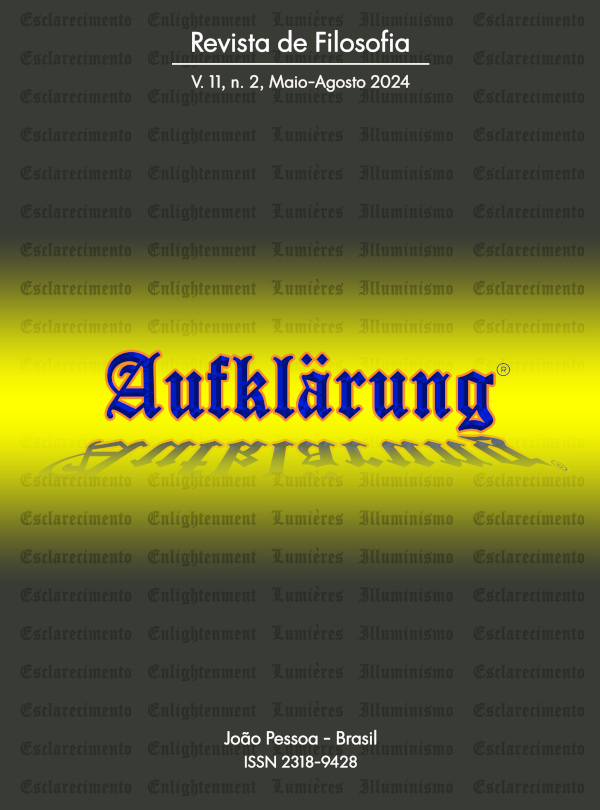Singularity as aesthetic happening
DOI:
https://doi.org/10.18012/arf.v11i2.67686Keywords:
reflexive judgment, aesthetic happening, singular and universal, Kant’s political thoughtAbstract
We usually don’t acknowledge social mediation when speaking about subjective experiences in day-to-day life, which relies instead on a unitary and essentialist notion of identity. I initially explore this statement by examining how Kant changes his view on singular-universal relation from the first to the third Critique. A closer look at the reflexive judgment and how it states singularity as a non-conceptualised event follows from that. I then argue in favour of an affinity between an aesthetic notion of singularity, such as found in the third Critique, and the political mobilisation of subjective experiences.Downloads
References
Adorno, T. & Horkheimer, M. (1985). Dialética do esclarecimento. Rio de Janeiro, RJ: Jorge Zahar Editor.
Arendt, H. (1982). Lectures on Kant’s political philosophy. Chicago: University of Chicago Press.
Butler, J. (2019). Relatar a si mesmo: crítica da violência ética. Belo Horizonte, MG: Autêntica.
Campello, F. (2022). Crítica dos afetos. Belo Horizonte, MG: Autêntica.
Cavarero, A. (2000). Relating narratives: storytelling and selfhood. Londres e Nova Iorque: Routledge.
Kant, I. (2018a). Crítica da razão pura. 9 ed. Lisboa: Fundação Calouste Gulbenkian.
Kant, I. (2018b). Crítica da faculdade de julgar. Petrópolis, RJ: Vozes; Bragança Paulista, SP: Editora Universitária São Francisco.
Locke, J. (2019). Segundo tratado sobre o governo: e outros escritos: ensaio sobre a origem, os limites e os fins verdadeiros do governo civil. Petrópolis, RJ: Vozes (Coleção Vozes de Bolso).
Luna, D., Ringberg, T. & Peracchio, L. (2008). One Individual, Two Identities: Frame Switching among Biculturals. Journal of Consumer Research, 35. DOI: https://doi.org/10.1086/586914
Hegel, F. (2014). Fenomenologia do espírito. 9 ed. Petrópolis, RJ: Vozes; Bragança Paulista, SP: Editora Universitária São Francisco.
Foucault, M. (1994). Qu’est-ce que les lumières?. In M. Foucault. Dits et écrits (Vol. 4, pp. 679-688). Paris: Gallimard.
Menke, C. (2013). Force: A fundamental concept of aesthetic anthropology. Nova Iorque: Fordham University Press.
Santos, L. (2010). A concepção kantiana da experiência estética: novidades, tensões e equilíbrios. Trans/Form/Ação, 33 (2), 35-76. DOI: https://doi.org/10.1590/S0101-31732010000200004.
Nobre, M. (2018). Como nasce o novo. São Paulo, SP: Todavia.
Taylor, C. (2001). Sources of the self: the making of modern identity. Cambridge, MA: Harvard University Press.
Shelley, P. (1824). One word is too often profaned. In: Shelley, P. (1977). Shelley’s Poetry and Prose. Nova Iorque: W. W. Norton & Company.
Wittgenstein, L. (2020). Tractatus logico-philosophicus. 3 ed.São Paulo, SP: Editora da Universidade de São Paulo.
Wittgenstein, L. (2022). Investigações filosóficas. São Paulo, SP: Fósforo.
Additional Files
Published
How to Cite
Issue
Section
License

This work is licensed under a Creative Commons Attribution 4.0 International License.
Journal general policy
1.This journal works under a Creative Commons License aplied to online journals. That icence can be read in the following link: Creative Commons Attribution 4.0 International (CC BY 4.0).
2.Accordingly to this License, a)the journal declares that authors hold the copyright of their articles without restrictions, and they can archieve them as post-print elsewhere. b)the journal allow the author(s) to retain publishing rights without restrictions.
Metadata Policy for information describing items in the repository
1. Anyone may access the metadata free of charge at anytime.
2.The metadata may be re-used in any medium without prior permission, even commercial purposes provided the OAI Identifier or a link to the original metadata record are given, under the terms of a CC BY license refered for the Journal.







































